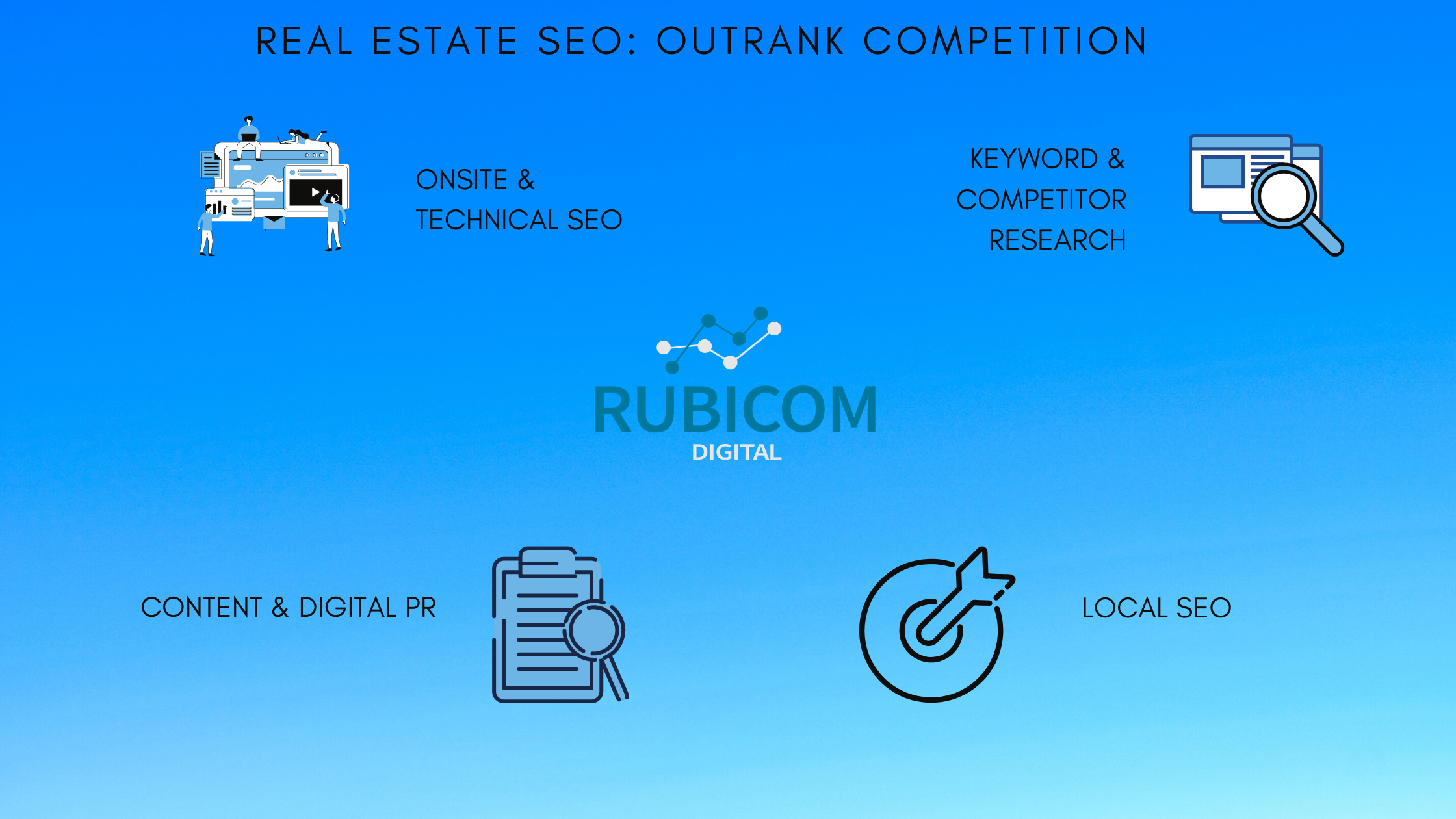When you think of getting leads as a real estate broker, you probably think of referrals. In fact referrals are the number one source of lead generation within the real estate industry for those looking to expand their clientele. Referrals are great, but there’s one tactic you’re probably not using that will pay dividends (leads) in the long run: Real Estate SEO.
What Is SEO?
Search Engine Optimization (SEO) is the practice of driving visitors to your website by taking actions that ensure your website and business are seen at the higher end of search engines (predominantly Google).
When you’re searching for a product or service, you probably rarely ever go past the first page of the search results, impactful SEO will ensure that you’re on the first page.
How Real Estate SEO Drives Leads
Real Estate SEO isn’t a tool that drives leads immediately but is rather an investment in the future of your organization that enables leads to flow in without having to focus on lead generation.
As an agent you’re continuously on the go. When you’re not, you’re probably trying to gain access to new clients which consists of outreach (dialing) and other manual tasks that take up your already limited time.
Search Engine Optimization enables you to start receiving inbound leads that come to you while you’re not necessarily focusing on lead generation. To quote Warren Buffett, “If you don’t find a way to make money while you sleep, you will work until you die.” In this case, SEO helps you gain leads (make money) while you sleep.
To sum up real estate SEO, your business will become more visible within search engines when your target audience is searching for a service that you provide. Ex: ‘real estate agent in New Jersey’.
Now that we’ve gone through what Real Estate SEO is, let’s break down the executables that will enhance your online visibility and effectively implement your real estate SEO strategy.
Executable Items
- Onsite & Technical SEO
Onsite (on-page)
This one is more straightforward; You’re organizing the structure of what is seen when a user visits your website or landing page. This could include but isn’t limited to:
– URL’s
– Titles
– Images
– Inbound and outbound links
The structure of the pages should clearly highlight what your offering is all about, while ultimately being easy to navigate and find what you’re looking for.
Technical SEO
Technical SEO is everything that goes into the backend of your website in order to ensure that your site is:
- Found on search engines
- Engaging for users
This includes but isn’t limited to:
– Enhancing website speed
– Submitted an index of your site to search consoles so that it can be easily crawled by search engines
– Efficient website structure
– Security to maintain user trust
– Cross-device functionality (Optimized for desktop, mobile, hand-held)
The ultimate goal here is to provide an enhanced, consistent experience on your website regardless of the device that your audience is using while visiting your page. A page that is slow, not secure, or not optimized for mobile/tablet won’t build trust among visitors.
2. Keyword and Competitor Research
Next up comes gaining competitor intel. The quickest way to determine who your competitors are (from an SEO standpoint) is to search (via Google) for the services that you offer and see which competitors come up on the first page. From that point, an analyzer will be run on your competitors’ sites to determine which search phrases (keywords) they’re receiving traffic from.
Once you have a better understanding of your competitors, a plan will be put in motion to outrank them and attempt to redirect website traffic that they’re receiving to your business.
A major advantage of SEO in comparison to advertising spend is that regardless of the size of your business, you’re able to compete with major competitors without the significant investment that ad-spend requires.
3. Local SEO
Gaining visibility online should immediately start within your local geography. If you’re not ranking within your local territory, it becomes even more difficult to rank within the surrounding areas while users are searching for your offering.
By submitting your business information, your target audience will be able to see your business and leave reviews about their experience with your organization. Here’s what that view looks like when a user searches for your business.
This coworking space shows photos of their office, how to get there, and the ability to access direct feedback from their community by checking out the Google reviews. In other words, this helps legitimize their business to the audience and assures credibility.
4. Content Marketing and Digital PR
Content
In our current era, content is key and will be the foundation of your digital marketing strategy. The main differentiator between you and a competitor that has impactfully implemented real estate SEO is that they’re probably producing much more quality content than your business. Content could include but isn’t limited to:
– Blog posts
– Infographics
– Whitepapers
– Podcasts
– Videos
By creating quality content, you’re able to inform your audience about how you solve their problem, gain visibility within search engines, and ultimately increase traffic to your website that can convert your audience to leads.
Digital Public Relations
Last but not least, digital PR. With an optimized website/landing pages, and quality content to validate your services, it’s time to reach out to informative outlets to further enhance visibility. This could include but isn’t limited to:
– Top real estate agent/brokerage list within your area
– Features from real estate specific sources
– Reviews and feedback management from those you’ve already served
a. Google reviews
b. Testimonials
c. VRBO/Airbnb reviews
An effective combination of content creation and digital PR will highlight the value you provide, ensure the value is visible to those looking for your services, and enable your business to start growing.
Future Lead-Generation Expectations
The entirety of this post is about implementing a completely new strategy to generating leads for your business by focusing on real estate SEO. But what about your current primary source of leads (referrals)?
Lead Generation of Past vs. Present
Although it won’t be easy, SEO presents the possibility of you no longer having to do the mundane task of prospecting for clients. That’s not to say that you can’t effectively leverage referrals, prospecting, AND SEO; It’ll give your organization flexibility as you begin to see more leads flow in.

Gary McConnell Co-founded Rubicom Digital in 2019 with a goal of providing digital marketing consulting services in the B2B space.
Gary continues to serve as the Marketing Director of a Data Center-focused IT Provider, VirtuIT Systems.

